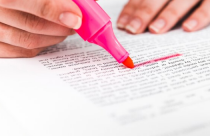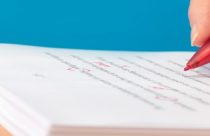An Insight into Manuscript Editing Processes: An Interview With Leonie Pipe (Part 1)

 In this interview, we have a discussion with Leonie Zandra Pipe, an editor at Enago. Leonie has a PhD in Physics from the University of Auckland, New Zealand, followed by a Postgraduate Diploma in Biological Sciences. She has also been a part-time Research Assistant for the Waikato Regional Council (Environment Waikato) and a lecturer in Statistics at the Auckland University of Technology.
In this interview, we have a discussion with Leonie Zandra Pipe, an editor at Enago. Leonie has a PhD in Physics from the University of Auckland, New Zealand, followed by a Postgraduate Diploma in Biological Sciences. She has also been a part-time Research Assistant for the Waikato Regional Council (Environment Waikato) and a lecturer in Statistics at the Auckland University of Technology.
Leonie is also a member of organizations such as the New Zealand Microbiological Society, Entomological Society of New Zealand (Auckland Branch), Vintage Phonograph Society of New Zealand and has also been the secretary of the former Self-Publishers’ Association of New Zealand. At Enago, she is in involved in editing papers, theses, and reports related to engineering, mathematics, nanotechnology, robotics, and neural networks.
In the first part of the interview, Leonie shares some thoughts on how manuscript editing is a learning process and helps her stay updated of the latest developments in her areas of interest. She also shares some important tips for new editors, which would help them improve their editing skills and avoid common errors while working on manuscripts written by ESL authors.
How do you keep yourself abreast of the latest happenings in a highly specialized area such as yours?
When I was engaged in research, I was in contact with a prominent researcher in my chosen field on LinkedIn and was notified of his latest output. If I want to keep abreast of the happenings in my field now, I search the relevant terms on Google Scholar, which brings up the latest articles in my field.
Does keeping abreast of current knowledge in your core area enhance your editing abilities, or does editing research papers help you better understand current developments?
Actually, I gain most of my knowledge of current developments in my field through editing research papers. Because the papers I edit are destined for publication, they represent the very latest in what is happening in the field. As I edit more of them, I get a feel for how the field is currently developing (for example, the use of robotics in rest homes for the elderly). Sometimes, I pick up a few field-specific keywords and search for them on the internet to see what is being published in the lines of those terms or sometimes look for articles with those keywords. While many online papers are available on the pay per view basis, the freely available abstracts also suffice for updating oneself on the latest happenings in a field.
Does editorial feedback really help authors? Do you agree with the concept of providing explanations for some changes you make in a text, for example in the comments?
I am a firm believer in inserting comments. Obviously, the editor shouldn’t make comments for every change made because that would flood the document and overwhelm the author. But where an author’s meaning is ambiguous, a comment indicating the alternative interpretation(s) can assist the author to make a meaningful amendment to the editor’s change if the editor has got it slightly wrong. In this way, the author can make a direct change without worrying about the grammar. Comments are also invaluable if the author has abbreviated a term without definition in both text and abstract (for informing him/her that abbreviations should be fully defined in both cases), or if the author has consistently used a term or symbol incorrectly, or (in some cases) for explaining why a word or phrase has been deleted.
How do you seek to improve on the feedback provided to you? If you have checked the final documents delivered to clients, what suggestions do you have for the community?
I carefully read any feedback delivered by the in-house editors and try to make a note of it and incorporate it the next time. I almost always check the final documents delivered to clients, but sometimes things can be missed on the second pass, especially if I am caught up with other assignments. However, I try my best to make a note of all the feedback I have received and incorporate them the next time. Moreover, I think there should be more opportunities for editors and authors to interact, especially if an editor has misinterpreted an author’s meaning. Recently, a client provided feedback on my edit because I had made meaning changes in two or three places. Such disagreements could be avoided or mitigated if authors were able to clarify with editors within a few days of the edit.
What are some general tips that you would give to amateur editors?
- Do not change a word or phrase that looks “wrong.” It might be normal terminology in the author’s specialist field.
- Do not alter words such as “examined,” “explored,” and “discovered.” When I was an amateur myself, I once altered “examined” to “discovered” and the authors did not like it one bit!
- Quality is paramount. It is preferred to inform that certain assignments will be delayed and hand the job outside of deadline (but still within reasonable limits) rather than handing in a sub-standard job before or exactly on deadline. That said, the deadline should be respected as far as possible
- Try to maintain the author’s voice. Some authors pose questions in their manuscripts; this is fine. Some authors consistently use the passive voice, so the voice should be changed to active only when it significantly improves the sentence. Also, check the journal requirements as a few journals still discourage the active voice.
- A second pass is mandatory. You will find not only the odd grammatical, punctuation, and spelling mistake but also changes you have made that look clumsy or downright wrong. You will want to amend these before sending the manuscript back to the client. The second pass will polish your edit so that it looks great, and you will get a great deal of satisfaction.
- Be on the lookout for common errors made by non-native English authors (double spaces between sentences, tildes instead of en-dashes for number ranges, incorrect attempts to make a ° symbol, variables that are italicized in equations but not in text).
- Most importantly, one should always take short, well-timed breaks, especially for assignments, that are extremely lengthy or require too much of your intervention. This reduces the possibility of you overlooking or introducing any errors and helps in maintaining the quality of the file.
- Also, it is important that academic editors stay updated with the latest technological developments happening in the field, including new software packages being developed for aspects such as consistency checks or fact-checking, as these may prove to be futuristic tools for reducing the number of human errors in editing a document. For example, the software tool PerfectIT allows editors to check certain inconsistencies and language-related errors.
- One can also attend events such as editor conferences, join online discussion forums and editor associations, and meet other editors to widen one’s horizon in this field.
(This interview is a part of our interview series of connecting scholarly publishing experts and researchers.)







